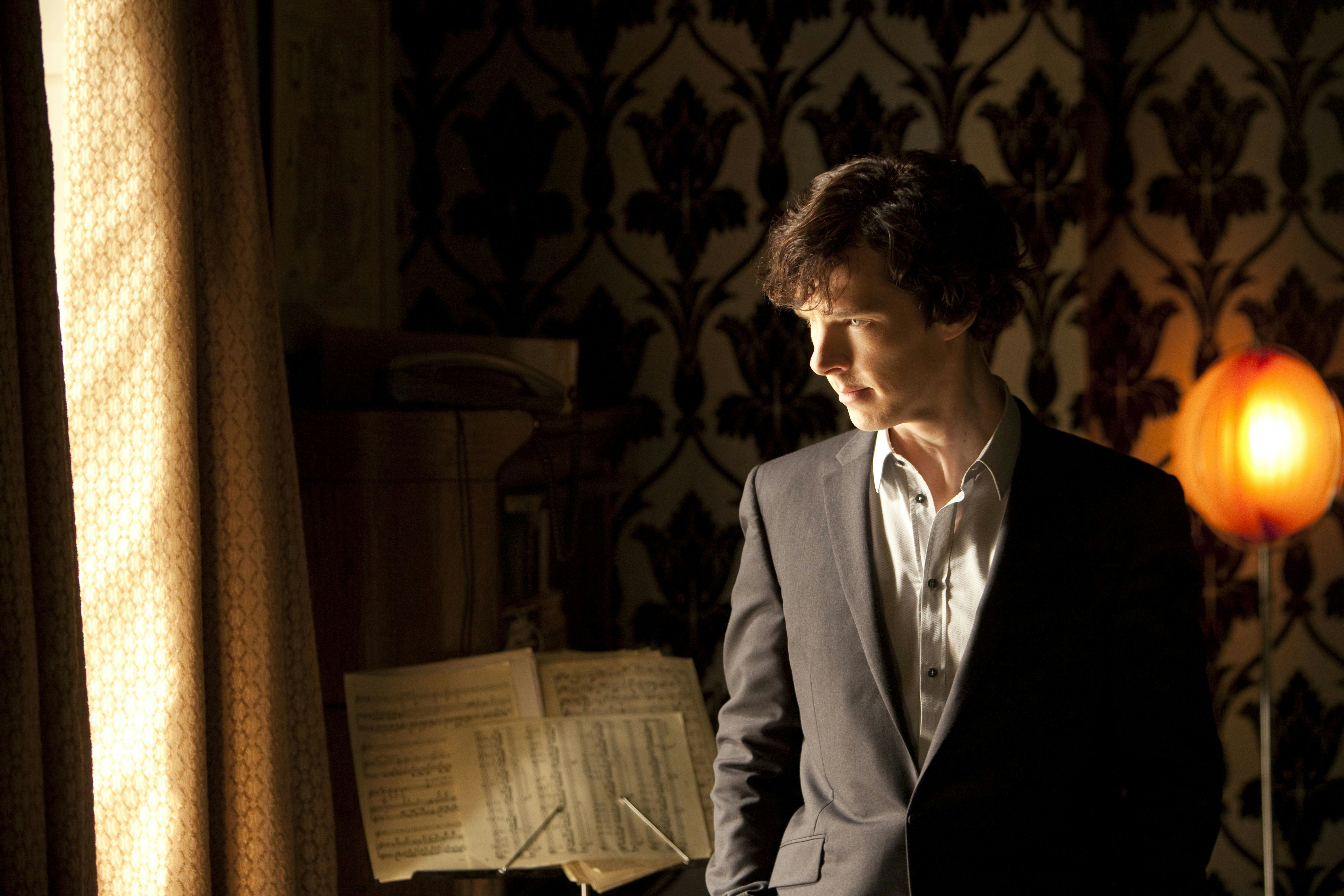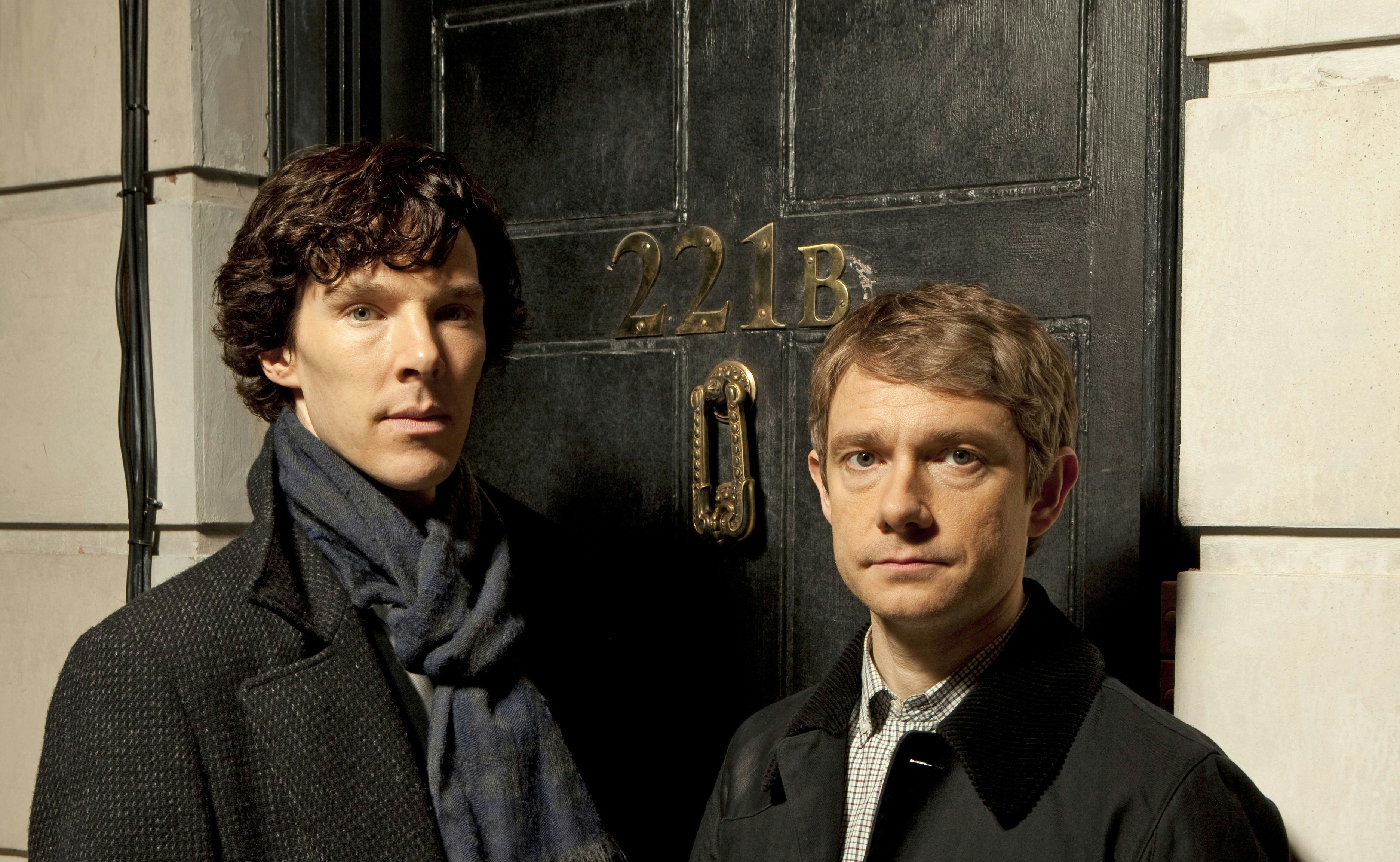
If you’ve ever been to a major Sherlock Holmes gathering (like the BSI weekend in New York City) or read any professional Sherlock Holmes fan magazine (like Sherlock Holmes Magazine), you’ll learn one crucial thing about this fandom: They embrace all versions of the beloved Baker Street mythos. As such, the Holmes fandom is sturdy and confident enough to be open to radical reinvigoration.
Fifteen years ago, on October 23, 2010, the fandom of Sherlock Holmes got the most exciting and vital reinvention of the character since Jeremy Brett’s beautiful and hilarious Holmes in 1984. That reboot was, of course, the BBC series Sherlock, starring Benedict Cumberbatch and Martin Freeman, created by Steven Moffat and Mark Gatiss (the former of which was doing double-duty at the time, running Doctor Who). And regardless of Tumblr rants or mean-spirited YouTube screeds, or even, perhaps, a general weariness one might have about seeing Benedict Cumberbatch in countless roles following this show, one immortal truth remains: Sherlock was great in 2010, it’s great in 2025, and it will be great in the year 3000.
Sherlock is an incredible, deft modern reinvention of one of the most wonderful literary creations of all time. It is perhaps one of the most important TV triumphs of the 21st century. It was also utterly responsible for pushing its two primary stars, Cumberbatch and Freeman, into the mainstream, which irreversibly altered pop culture forever. And we don’t even have time to talk about Andrew “hot priest” Scott.
I’ve been a Sherlock Holmes person since childhood, thanks mostly to The Real Ghostbusters, and the Holmes connections to the Star Trek canon. But once you really get into Holmes as an adult, say, around 28, you’re old enough to have read the stories from different angles and at different times in your life. You’ve also read enough of the pastiches and deep dives to appreciate that part of what makes new Holmes adaptations so great isn’t that they fulfill a checklist of what they get “right,” but instead, relish in what is new and different. This is crucial, and it's key to understanding why Sherlock is good, even if you don’t like it: The Holmes fandom survives and endures on variations and differences. And with the debut episode, “A Study in Pink,” the newness of this Holmes was so expertly blended with the familiar that while watching it, it was hard to believe it hadn’t always existed.
Pretend, for a moment, that social media was not as powerful today as it was then. Try to imagine a world of flip phones, a time in which text messaging had barely caught on, and a world in which putting your photo on the internet required you to plug something into a computer and wait. Bad takes on pop art didn’t immediately color everyone’s perception of a new book, show, or film, and you could still enjoy something that had been out for months without already having a billion internet opinions predisposing you to one side or another.
This was the world in which Sherlock was released, a world in which it debuted on the BBC in October 2010, but wasn’t streaming in the U.S. until the following year. To paraphrase LCD Soundsystem, I know this because I was there. I was literally the first person I knew searching for pirate streams of Sherlock, to watch this strange new show, which at that time, had just released one episode in the U.K. Here’s what I knew about the show at the time: I loved Martin Freeman from original version of The Office and the 2005 Hitchhiker’s Guide to the Galaxy, and, like a lot of Doctor Who fans of the time, felt that Moffat had written some of David Tennant’s best episodes. I did not know who Benedict Cumberbatch was, and I was concerned that he looked too young and goofy to be a good Holmes. And then I watched “A Study in Pink.” And it was a revelation.

Smartly, the first episode of Sherlock situates the narrative from Watson’s point of view. He’s a veteran, having served in Afghanistan (strangely, just like the original Victorian Watson), and his therapist has suggested that he write a blog to deal with his PTSD. The idea is that everything he writes down in his life will be therapeutic to him. “Nothing ever happens to me,” Watson says ominously, because the real adventure of his life is about to begin.
In the original stories, the idea that Watson had written down these stories, and that we were reading an after-the-fact version of something real, was a stroke of genius on the part of Doyle. Obviously, he didn’t invent this mode of storytelling, but that element of meta-fiction has always allowed an elusive truer version of Sherlock’s adventures to lurk out there in the ether, fueling fan speculation for nearly a century and a half. But the literary device of Watson as a writer is actually something nearly every single film and TV adaptation struggled with prior to Sherlock. Does the concept of John Watson’s blog being recommended by a therapist make sense? Maybe not. But in 2010, the idea that someone’s blog could blow up overnight was very much a thing, and so, for the first time, the element of Watson as the writer and storyteller became not just believable in live-action, but contemporary.

The dynamic between Cumberbatch’s Holmes and Freeman’s Watson revealed Gatiss and Moffat's keen instinct for the what made the source material special. They perceived, correctly, that the central conceit of the majority of stories — that Watson and Holmes are a dramatically bizarre and unlikely duo — was perhaps a bit undersold by Doyle.
So, smartly, the series took the situational given of the stories — that Holmes is really annoying and hard to live with — and made that quirk the primary focus of nearly everything in the entire series. It’s faithful to the Conan Doyle text, but also supercharged. Cumberbatch’s Holmes insults people to their faces, rudely points out who is sleeping with whom, and confides in Watson that when he elucidates his methods of deduction, most people tell him to “piss off.” This was not your father’s Sherlock Holmes, yet he very much was. Cumberbatch’s performance channels a bit of Brett’s flippancy and charm from the beloved Granada series, but he also creates whatever it is that we know and think of as quintessentially Cumberbatchian.

Of course, no retrospective of Sherlock can be complete without mentioning the backlash. This took the form, primarily, in a 2017 video essay published by “Hbomberguy” called “Sherlock is Garbage and Here’s Why.” Without getting too deep into the weeds, the primary gripe was this: the actual mystery-solving element of the show was weak, and as such, Sherlock was less of a mystery procedural and more of a show about a geeky anti-hero. Setting aside some of the venom and hyperbole of this argument, one can agree with this central complaint and still see why the show is incredible.
Conan Doyle’s Sherlock Holmes wasn’t popular because of a mystery element or crisp whodunit structure. Countless tales from “The Five Orange Pips,” the famous novella, The Hound of the Baskervilles, have unwieldy or odd structures. Many are not even traditional mysteries; notably, the excellent and famous “A Scandal in Bohemia,” in which there is no actual crime, and Holmes loses in the end.
The goals that Moffat and Gatiss had with Sherlock were clearly aimed more toward the literary, character aspirations of the Holmes canon, rather than the mysteries. Yes, the over-the-top cases are the artifice upon which the show is built, but the cases themselves are not what the series is about. What Sherlock dared to do was to create a sometimes humorous, often tragic, always entertaining story about Holmes and Watson, and tried to imagine what these superhero-type figures might actually be like in a modern version of London.
To list all the ways that Sherlock achieved that goal would also encompass several spoilers. But by the time the show’s second season was released, the series had given modern updates to nearly all the best and most famous Holmes stories, while also very much sticking close to the ethos of the show being fixated on John and Sherlock’s dynamic. While one could argue that there are diminishing returns in Seasons 3 and 4, the show never wavers from its commitment to depicting Holmes and Watson as real and flawed men, rather than “good guys” who are always right or always win.
Most original Holmes stories are preceded by the phrase “The Adventure of” rather than “The Mystery of.” And that’s what Sherlock succeeded most at doing: Putting contemporary, realistic versions of Holmes and Watson into outlandish adventures. The plots may not have always made sense, but the characters always did. And in that sense, Moffat and Gatiss accomplished something that perhaps Conan Doyle never fully did: they made Sherlock seem like someone you might actually meet.







